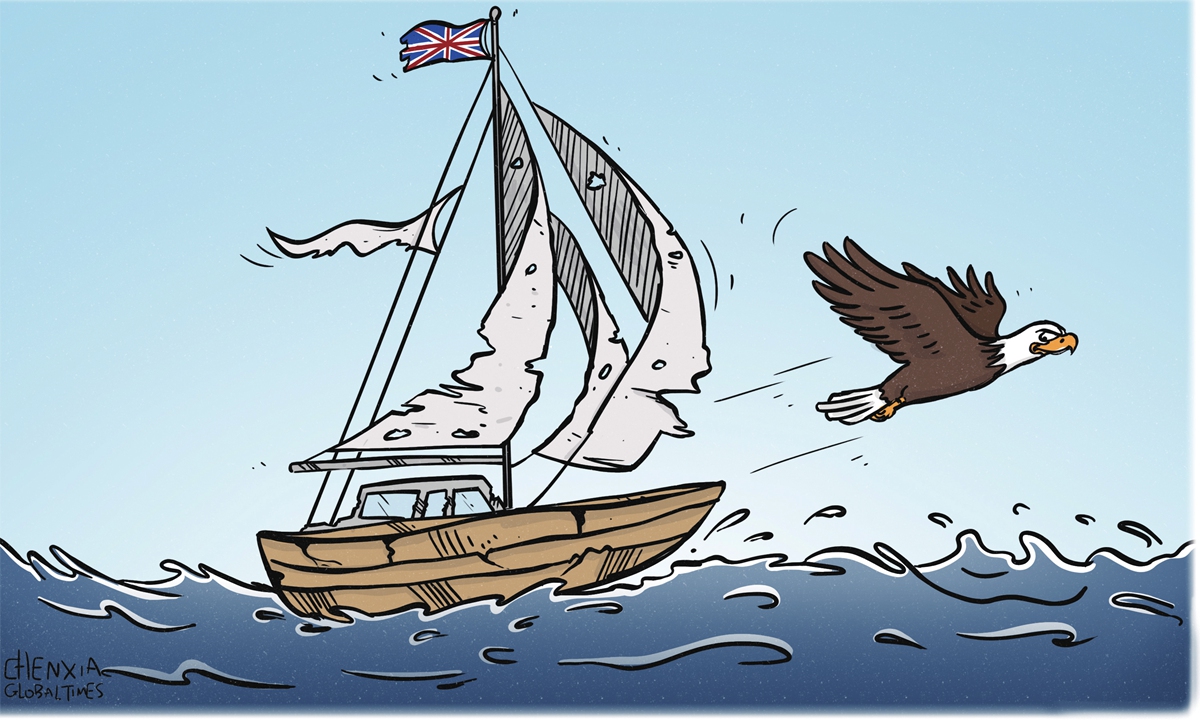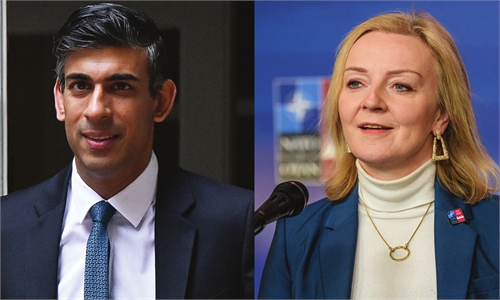UK candidates kowtow to US anti-China agenda, making Britain’s foreign policy unhinged

Illustration: Chen Xia/GT
Both British Conservative leadership candidates are attempting to aggressively "out-hawk" each other on the subject of China. The two contenders are desperately attempting to appeal to a very narrow and right-wing base of Conservative Party voters, who have more than willingly bought in to the US-led agenda against Beijing, of which it is now kowtowing Britain into following. Because of this, there is no reason, moderation or practical consideration whatsoever regarding the UK's relationship with China, one of its most important trade and investment partners, creating an ugly race to the bottom. It also illustrates just how unhinged Britain's contemporary foreign policy has become in the midst of Brexit.Whilst Britain's foreign policy has always been considerably controlled by the US, in recent years this has only got worse as factional struggles in a Conservative Party lurching to the right, have silenced and snuffed out voices of reason in favor of Neo-imperialist, great power delusion which has discarded reality in favor of populism and nationalism, mixed with extreme Neoconservatism. It is an ideology which hurts and self-harms Britain's interests across the board, establishing itself as a consensus through the dominance of the notorious right-wing press, which is known for misinformation and scapegoating in favour of Conservative governments.
Brexit was the tipping point in this transformation, particularly in how it changed the balance of power. The victory of "Leave" in the EU referendum of 2016 has seen the liberal pragmatist and pro-business wing of the party defeated by the hard eurosceptics, which Boris Johnson exploited in his rise to power to depose the governments of both David Cameron and Theresa May. This created the new talking point of "global Britain" which whilst initially being pro-China in seeing its business opportunities, was soon blended into a mantra of Sinophobia and Neoconservative aggression under the discourse of "Britannia rules the waves"- thanks to the influence of right-wing hardliners.
Boris Johnson may have initially considered himself as a "Sinophile" and attempted to be favorable to China, but he soon found himself lost amidst these growing voices for confrontation and pressure from the US to change course, which he eventually succumbed to. The "golden era of relations" with China, with Britain once heralded as "China's partner in the West" was over amidst the COVID-19 pandemic, anger over Hong Kong, and relentless American propaganda purposefully weaponizing the issue of Xinjiang.
As it is with Europe, this foreign policy direction is completely out of touch with reality, and seeks to damage the country's ties with the outside world in the view to attaining short-term domestic political gains. Despite the fact that leaving the EU has been disastrous for the British economy, the Conservative leadership hopefuls are now intent to draw on confrontation against China, another major trading and commercial partner of the UK, to pacify the rabid membership base and the government's wider public unpopularity. This includes the weaponizing of explicit paranoia, hysteria, known as "Yellow Peril" and falsely framing China, a country on the side of the world, as an existential threat to the UK. It is of course an irony that both candidates speak of "free trade" and building a "business friendly" Britain, but they are intent on alienating and confronting the largest consumer market and trading nation on the Earth.
Ultimately, a "Global Britain" does not kowtow to the foreign policy of the US and making someone else's struggle for hegemony their own. In doing so, neither candidate shows any imagination or political initiative in fighting for Britain's real interests in the amidst of a country which faces surging inflation, shrinking incomes, stagnant GDP growth and growing industrial rest. Rather, they succumb to a crowd who cannot come to terms with the country's place in the world, dreaming instead of a long-gone era and believing that China is a still weak country who needs Britain. In reality, it is the other way round, and the UK should humble itself or face even deeper economic repercussions as it digs deeper into the disastrous course it has committed itself to.
The author is a political and historical relations analyst. opinion@globaltimes.com.cn

